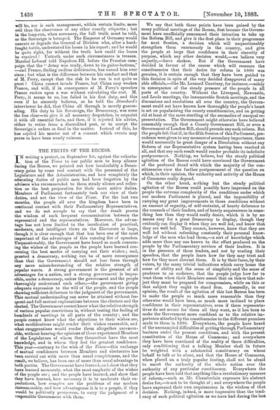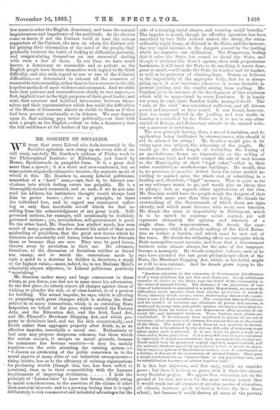THE FRUITS OF THE RECESS.
IN writing a protest, on September 1st, against the exhorta- tion of the Times to our public men to keep silence during the Recess, we pointed out how incalculably a Demo- cracy. gains by some real contact with the personnel of the Legislature and the Administration, and how completely the educating duties of public men had been forgotten by the advisers who recommended to them steady silence and reflec- tion as the best preparation for their more active duties. Members of Parliament fortunately took our view of their duties, and not the view of the Times. For the last two months, the people all over the kingdom have been in continual contact with their Parliamentary Representatives, and we do not scruple to say that the result proves the wisdom of such frequent communication between the represented and the representatives. Moreover, the advan- tage has not been limited to the inculcation of practical, moderate, and intelligent views on the Electorate at large, though it is clear enough that that has been one of the most important of the advantages of this running fire of speeches. Unquestionably, the Government have heard as much concern- ing the wishes of the people as the people have learned con- cerning the best modes of carrying out their wishes ; and, granted a. democracy, nothing can be of more consequence than- that the Government should not lose force through any mere misunderstanding of the relative strength of popular wants. A strong government is the greatest of all advantages for a nation, and a strong government is impos- sible,under a democracy, unless the government and the people thoroughly understand each other,—the government giving adequate expression to the will of the people, and the people showing sufficient deference to the judgment of the government. This mutual understanding can never be attained without fre- Tient and full mutual explanations between the electors and the elected. The Government cannot know what the relative strength of various popular convictions is, without testing the feeling of hundreds of meetings in all parts of the country ; and the people cannot know what the objections to their wishes are, what modifications might render their wishes reasonable, and what exaggerations would render them altogether unreason- able, without hearing the opinions of those experienced Members of the Legislature of whom they themselves have the most knowledge, and in whom they feel the greatest confidence. This year—contrary to the wish of the Times—this exchange of mutual confidences between Members and electorates has been carried out with more than usual completeness, and the result, we believe, has been one of more than usual advantage to both parties. The Government have learned, and show that they have, learned accurately, what the most emphatic of the wishes of the people are ; and the people have learned, and show that they have. learned, how necessary it is to moderate their ex- pectations, how complex are the problems of our modern statesmanship. and how advantageous it is to a people, if they would be politically prosperous, to carry the judgment of a responsible Government with them. We say that both these points have been gained by the many political meetings of the Recess, first because the Govern- ment have unofficially announced their intention to take up the Reform Bill, and give it the first place in their programme for next Session, a decision which will unquestionably strengthen them enormously in the country, and give the people at large that confidence in their sincerity of purpose, which any other decision would,—we believe very unjustly,—have shaken. But if the Government have decided in favour of the course which will reassure the constituencies that their desire for reform in 1880 was genuine, it is certain enough that they have been guided to this decision in spite of the very decided disapproval of many able officials,—like Mr. Leonard Courtney, for instance,—solely in consequence of the steady pressure of the people in all parts of the country. Without the Liverpool, Newcastle, and Leeds meetings, the innumerable Scotch meetings, and the discussions and resolutions all over the country, the Govern- ment could not have known how thoroughly the people's heart is set on popularising the county constituencies, and on getting rid at least of the more startling of the anomalies of unequal re- presentation. The Government might otherwise have believed reasonably enough that a County Government Bill, or even a Government of London Bill, should precede any such reform. But the people felt that if, in the fifth Session of this Parliament, pre- cedence were given to any measure of secondary importance, there would necessarily be great danger of a Dissolution without any Reform of our Representative system having been reached at all, and that any such result would render probable its indefinite postponement. Nothing, we believe, but the steady political agitation of the Recess could have convinced the Government of the profound dread with which the majority of the con- stituencies view the further postponement of the question on which, in their opinion, the authority and activity of the House of Commons really depend.
On the other hand, nothing but the steady political agitation of the Recess could possibly have impressed on the people the extreme complexity of the conditions under which our modern Parliament is placed, and the impossibility of carrying any great improvements in those conditions without an amount of sagacity, of self-restraint, of hearty deference to the counsels of their leaders, and of hearty acquiescence in some- thing less than they would really desire, which it is by no means easy for a great Democracy to display, though they evidently can display it when they are well led, and know that they are well led. They cannot, however, know that they are well led without refreshing constantly their personal know- ledge of the men who lead them,—a sort of knowledge which adds more than any one knows to the effect produced on the people by the Parliamentary services of their leaders. It is in the presence of these leaders, and not by reading their speeches, that the people learn how far they may trust and how far they must distrust them. It is by their faces, by their voices, by the many trivial indications which carry home the sense of ability and the sense of simplicity and the sense of prudence to an audience, that the people judge how far to trust them when their Members assert that on this or that sub- ject they must be prepared for compromises, while on this or that subject they ought to stand firm. Assuredly, in our opinion, the result of the agitation of this last Recess has been to make the people as much more reasonable than they otherwise would have been, as much more inclined to place confidence in their representatives, even if these representa- tives do not secure for them all they want, as it has been to make the Government more confident as to the relative im- portance attached by the constituencies to the different promises made to them in 1880. Everywhere, the people have heard of the unexampled difficulties of getting through Parliamentary business under the present conditions, and with the present constitution of the House of Commons ; and everywhere they have been convinced of the reality of those difficulties, only conditioning that a talking Member shall in future be weighted with a substantial constituency on whose behalf to talk or be silent, and that the House of Commons, when placed on a truly popular footing, shall not be afraid to assert the authority of the whole nation over the authority of any particular constituency. Everywhere the people have been told that anything like a revolutionary measure of reform,—such as Mr. Chamberlain expresses his abstract desire for,—is not to be thought of ; and everywhere the people have expressed their own acquiescence in the wisdom of that decision. Nothing, indeed, is more impressive than the tend- ency of such political agitation as we have had during the last
few years to sober the English democracy, and tame the natural imperiousness and impatience of the multitude. As the electors come to know, if not the Cabinet itself, at least the various supporters of the Cabinet, the men on whom the Cabinet rely for gaining their information of the mind of the people, they gradually contract the habit of looking at difficulties patiently, and congratulating themselves on any successful dealing with even a few of them. In our time, we have never known a democracy so reasonable and so patient as the English people have shown themselves with regard to the Irish difficulty, and also with regard to one or two of the Colonial difficulties,—so determined to exhaust all the resources of reasonable statesmanship, rather than to have recourse to the old, hopeless methods of mere violence and command. And we attri- bute that patience and reasonableness chiefly to two sources,— first, implicit trust in the high purposes of their great leader; and next, that constant and habitual intercourse between them- selves and their representatives which has made the difficulties of the House of Commons almost as visible to them as if they had been present continually at its debates. We may depend upon it, that nothing pays better politically,—at least with such a people as the English,—than to take a democracy into the full confidence of the leaders of the people.



































 Previous page
Previous page